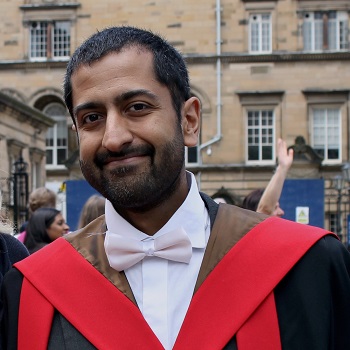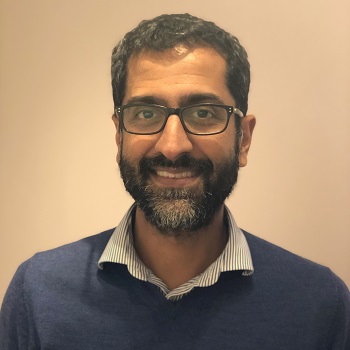 Dr Prakash Ramachandran graduated from Edinburgh Medical School in 2003 and has been fascinated by the liver ever since a research project during his intercalated year. He is currently a Clinician Scientist and Honorary Consultant Hepatologist, based in the Centre for Inflammation Research at the University of Edinburgh. We chatted to Prakash about his career journey so far.
Dr Prakash Ramachandran graduated from Edinburgh Medical School in 2003 and has been fascinated by the liver ever since a research project during his intercalated year. He is currently a Clinician Scientist and Honorary Consultant Hepatologist, based in the Centre for Inflammation Research at the University of Edinburgh. We chatted to Prakash about his career journey so far.
What have you been up to since graduation?
I graduated from the University of Edinburgh in 2003. I subsequently did my PRHO and SHO jobs in South-East Scotland followed by a year working in New Zealand. I then returned to Scotland to do my registrar training in hepatology, gastroenterology and general medicine.
My clinical training was interspersed with a range of research projects, but my passion for academic hepatology was really fuelled by my Wellcome Trust funded PhD between 2008 and 2011. Ever since then, liver research has a remained a huge part of my job and I have been fortunate to obtain MRC Clinician Scientist and Senior Clinical Fellowships to allow me to continue research alongside my clinical practice.
Why did you choose this career path?
I have been fascinated by the liver ever since a performing a research project during my intercalated BSc honours degree. Clinically, liver diseases are a huge global healthcare problem affecting 844 million people worldwide. The incidence continues to rise, meaning there is a desperate need for new treatments. The liver has an unparalleled capacity to regenerate, but this regenerative potential is overwhelmed when the liver becomes damaged. Understanding the mechanisms controlling these repair responses, how they are disrupted in liver diseases and how they can be targeted therapeutically have been a major focus of my research work.
What is your current research focus?
The main focus of my research is understanding the mechanisms which regulate liver scarring (or fibrosis). Fibrosis occurs which different causes of chronic damage to the liver, and patients with more fibrosis are more likely to end up with symptoms and complications. Fibrosis is a complex process with lots of different liver cells involved. We focus on figuring out how these different cells regulate fibrosis, in particular immune cells called macrophages which we have shown to be very important in this process. We use a range of cutting-edge approaches to study liver macrophages in both patient liver tissue and models of fibrosis, to better understand how these cells behave in diseased liver and how we might block their function as a new treatment for liver disease.
What are your hopes for the future?
Our work in recent years has allowed us to really home in on the particular macrophage population which we believe to responsible for regulating fibrosis. This opens up the possibility of trying to target this specific macrophage population as a new treatment for fibrosis. Over the next few years, I hope that we will make progress on identifying the best ways of achieving this and ultimately be able to translate these findings into better therapies for patients with chronic liver diseases.
 Can you give us an insight into a typical day in your role as Honorary Consultant Hepatologist, Royal Infirmary of Edinburgh?
Can you give us an insight into a typical day in your role as Honorary Consultant Hepatologist, Royal Infirmary of Edinburgh?
I spend approximately 20% of my time working as a Consultant Hepatologist at the Royal Infirmary of Edinburgh. This involves doing clinics in the Edinburgh Transplant Unit, where I see patients from around Scotland with a wide variety of liver diseases who have either previously had a liver transplant or are waiting for a liver transplant.
I also spend six to eight weeks per year looking after patients with a range of liver diseases who are inpatients at the Royal Infirmary of Edinburgh. I find both of these clinical roles highly rewarding. The team ethos is central to delivering high quality care, and I have been very fortunate to have fantastic colleagues who are always available for advice.
What do you enjoy doing in your free time?
I can’t claim to have any exciting or exotic hobbies! Most of my spare time is spent with my family and I love sport, cooking and travelling.
Any pivotal moments in your career to date?
Obtaining research fellowships from the Wellcome Trust in 2008 and the MRC in 2016 and 2021. These fellowships have enabled me to have the dedicated time, flexibility and resources to develop my research and clinical career in parallel.
Any advice for medical students looking to pursue a career in research as well as clinical?
I am in the fortunate position to really love my job, so I would wholeheartedly recommend a career in academic medicine. If I have one piece of advice to medical students who are interested in research, it would be to seek out opportunities to get involved. People love talking about their research and are always on the look out for enthusiastic motivated students to work on different projects, so don’t be afraid to ask!


